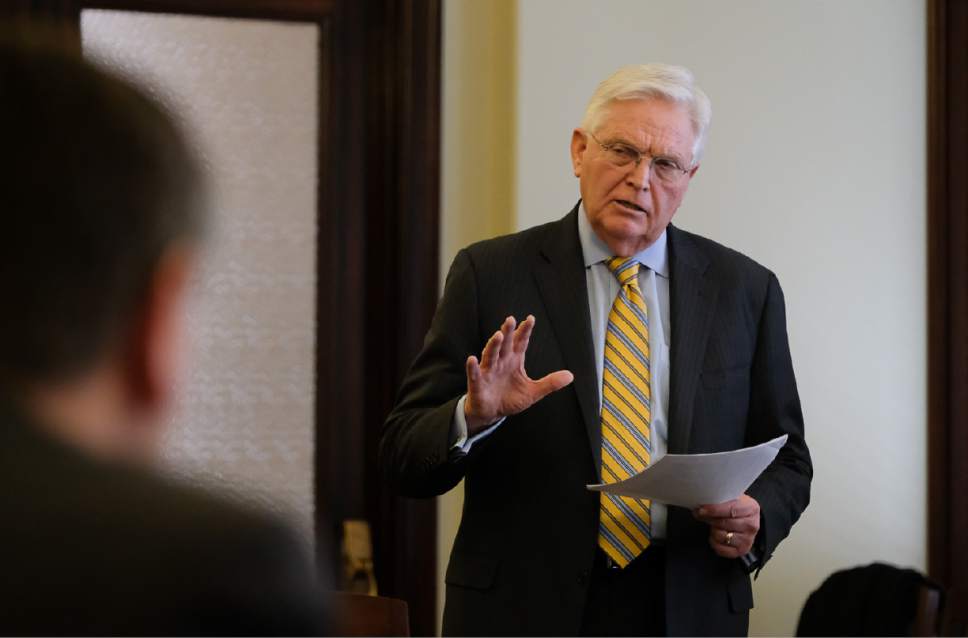This is an archived article that was published on sltrib.com in 2017, and information in the article may be outdated. It is provided only for personal research purposes and may not be reprinted.
A Utah lawmaker unveiled a bill this week that would make sweeping changes in how youth are treated in the state's juvenile justice system.
HB239 emphasizes early intervention, with the goal of keeping low-risk youth offenders in their homes instead of detention centers. The bill would also limit the amount of time youth can spend in detention centers, put a cap on fees and service hours that a juvenile judge can order, and require that lawyers be provided to all juveniles charged criminally.
The legislation is a result of six months of study by the Utah Juvenile Justice Working Group, which is composed of juvenile judges, attorneys, legislators and others appointed by the governor to study how youths are treated in the state's justice system.
The working group's study found that Utah youths who were deemed "low-risk" often were progressing deeper into the juvenile justice system. And if juveniles are placed out of the home — whether that be in a detention center, a group home or other placement — they fared worse and reoffended more often than those who were allowed to stay in their homes, according to the working group's report.
Bill sponsor Rep. V. Lowry Snow, R-Santa Clara, said Tuesday that the lengthy and "very complex" bill proposes broad changes that will impact youths. He said that as the working group conducted their study last year, many youths reported that they felt isolated from their families and hopeless in the current system.
"These young people, they had no road map for getting out," Snow said at a Juvenile Justice Coalition luncheon. "[There's] no outline for what it is they have to do to extricate themselves from the juvenile system ... When they don't have that knowledge and that outline, it is a feeling of hopelessness."
Snow said the primary goal of the legislation is to change how juveniles are dealt with in the criminal justice system, while not jeopardizing public safety. But the proposed changes will also cut costs, he said.
The working group found that "nonsecure out-of-home placements" — facilities where youths reside, but the doors are not locked — can cost 17 times more than community supervision, but result in similar rates of reoffending.
A bed at a nonsecure facility can cost as much as $127,750 per year, according to the findings, and, on average, nearly $44,000 a year. Community supervision, in which the child remains in his or her own home, costs the state up to $7,500 per year.
Oftentimes, youths were taken out of their homes simply because the services they needed, such as substance abuse or mental health treatment, weren't available in their community, according to Ron Gordon, the executive director of the Utah Commission of Criminal and Juvenile Justice.
As more youths are kept in their homes instead of out-of-home placements, those savings will be reinvested to provide services throughout the state to youths in the early intervention stages, according to the group's report.
Snow's bill would limit the time a youth can spend in detention to six months — unless the juvenile is charged with certain violent felony-level offenses, such as murder, aggravated sexual assault or aggravated kidnapping.
It also introduces a "tiered response to school-based behavior," so students who are truant or commit other minor crimes are being handled by a team of crisis intervention professionals and a solution can be reached without involving the juvenile court system.
"Young people are redeemable," Snow said. "Especially given things that happen in their lives at a young age, [it] doesn't mean it should affect them for the rest of their lives."
When asked if he believed there would be opposition from fellow lawmakers, Snow said some may question the initial expense of such sweeping changes. The bill does not yet have a fiscal note, and he said he doesn't yet know how much it might cost.
"This much I do know," he said, "I think once you realize that a system needs attention and that we're spending too much money in one direction, it doesn't make a lot of sense to say this is a great idea, but let's delay it two or three years."
Representatives with the Sutherland Institute, Libertas Institute and Americans for Tax Reform all voiced support of the bill on Tuesday during the luncheon sponsored by the three organizations.
"[The bill] is a community-driven solution that recognizes the important and critical role that family plays in the juvenile justice system," said Derek Monson, director of public policy for the Sutherland Institute.
Paul Blair, Americans for Tax Reform's Strategic Initiatives Director, said they supported the proposed legislation because it is "tough on crime," but also "tough on spending."



